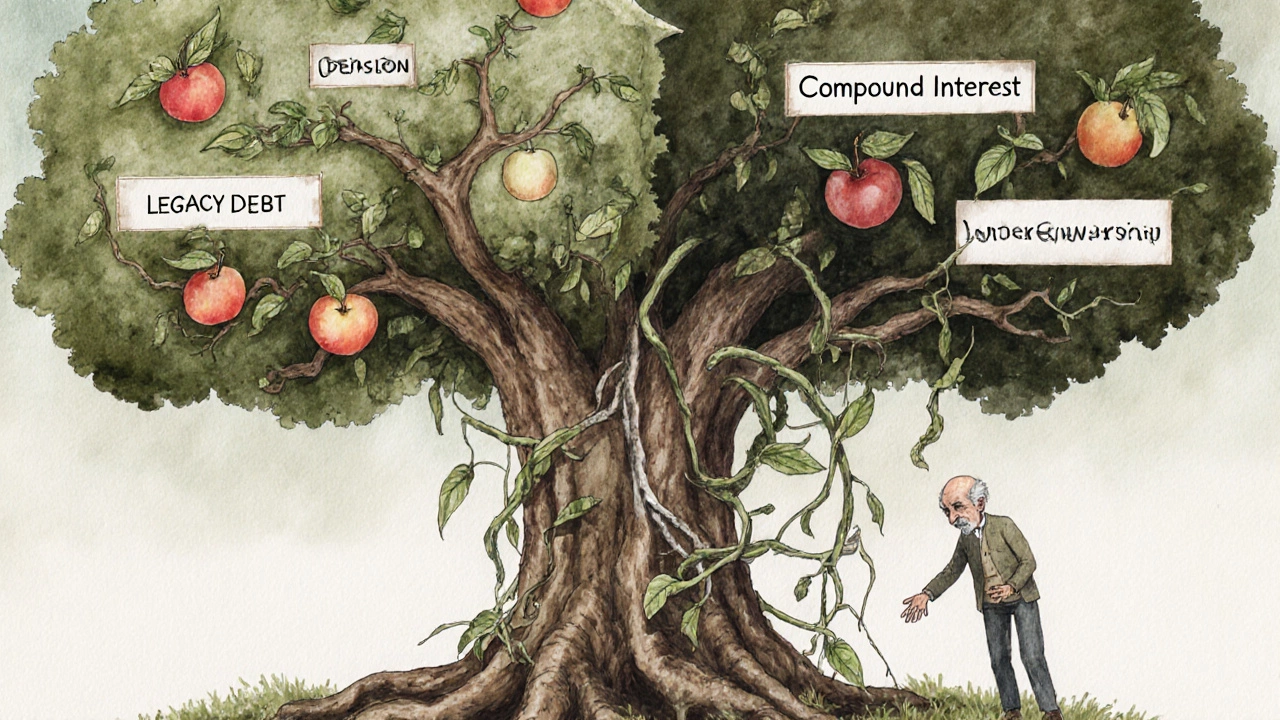Equity Release Compound Interest Calculator
Visualize Your Equity Loss Over Time
See how quickly your home equity disappears with compound interest in equity release plans. This tool shows the impact of different interest rates and timeframes.
Your Equity Projection
Enter your details and click calculate to see the impact.
Equity release sounds simple: unlock cash from your home without moving. But behind the smooth talk of "financial freedom" and "live comfortably in retirement" are real, lasting costs that many people don’t fully understand until it’s too late. If you’re considering equity release in Australia - whether you’re 60, 70, or older - you need to know what you’re trading away. It’s not just about the money you get today. It’s about what you lose tomorrow.
You’re Giving Up Ownership
When you take out an equity release plan, you’re not borrowing against your home - you’re selling part of it. With a lifetime mortgage, you keep living there, but the lender owns a growing share of your property. With a home reversion plan, you sell a chunk of your home outright and get a lump sum or regular payments. Either way, your ownership shrinks. That means less to leave to your kids, less to sell if you need to move into aged care, and less control over what happens to your home after you’re gone.Take Sarah, 72, from Newcastle. She released $300,000 from her $800,000 home in 2020. By 2025, with compound interest, the loan balance had grown to $480,000. Her home is now worth $950,000, but she only owns about 50% of it. Her daughter won’t inherit much - if anything - after fees, interest, and legal costs are paid. Sarah didn’t realize how fast that interest adds up.
Compound Interest Eats Your Equity Fast
Most equity release products use compound interest. That means you’re charged interest not just on the original amount you borrowed, but also on the interest that’s already piled up. It doesn’t get paid monthly like a regular mortgage. It rolls up. And it grows exponentially.Let’s say you release $200,000 at a 5.5% annual rate. After 10 years, you owe $340,000. After 20 years? $560,000. After 30? Over $900,000. That’s not a typo. In a 30-year scenario, the original loan has more than quadrupled. If your home doesn’t appreciate dramatically - and many don’t - you could end up owing more than your house is worth. That’s not hypothetical. The Australian Securities and Investments Commission (ASIC) has documented cases where retirees owed 200% of their home’s value.
You Lose Access to Government Benefits
Releasing equity often means you get a big lump sum. That cash counts as an asset when Centrelink assesses your eligibility for the Age Pension. If you have more than $278,500 in assessable assets (as of 2025), your pension starts to reduce. If you go over $630,500, you lose it entirely. That’s a hard trade-off: $200,000 in cash today for $20,000 a year in pension payments for life.Many retirees don’t realize that the lump sum from equity release can trigger an asset test failure. One man in Geelong released $250,000 to pay off medical bills. He didn’t know he’d lose $18,000 a year in pension. By year three, he was worse off than before - and stuck with a growing debt he couldn’t repay.

It’s Hard to Change Your Mind Later
Equity release isn’t like a credit card you can pay off next month. Early repayment penalties are steep. Some lenders charge 20% or more if you want to pay back the loan within the first five years. Even if you inherit money or sell another asset, you might not be able to get out without losing half your payout.And if you change your mind about staying in your home - maybe you want to move closer to family or downsize - you’re locked in. You can’t just sell. You have to repay the full loan balance, which may now be far higher than what you originally received. There’s no easy exit.
Your Family Gets Left With the Mess
When you pass away, the loan becomes due. That means your estate - or your heirs - must repay it. Usually, the home is sold. But if the debt has grown too large, your family might get nothing. Or worse, they might be forced to sell the home they expected to inherit.Some families face emotional and legal battles because the deceased didn’t explain the terms. One widow in Adelaide found out her husband had taken out an equity release plan with no mention of it in his will. The lender demanded repayment within six months. She had to sell the house she’d lived in for 45 years - and got nothing left over.
You Might Be Pushed Into Poorer Deals
Not all equity release providers are equal. Some push high-interest products with hidden fees. Others don’t explain the full impact of compound interest. Even regulated firms can use confusing language to make the product seem safer than it is. A 2024 ASIC review found that 38% of equity release applicants didn’t understand how compound interest worked - and 27% didn’t know they could lose their home.Always get advice from a licensed financial adviser who’s independent and paid by the hour, not by commission. Avoid anyone who says, "This is the best option for retirees." There’s no such thing. Every situation is different.

There Are Better Ways to Get Money in Retirement
Before you sign anything, ask yourself: are there alternatives?- Selling and downsizing: Move to a smaller home, pocket the difference, and keep your pension intact.
- Part-time work: Even 10 hours a week can add $10,000 a year without touching your home.
- Reverse mortgage alternatives: Some banks offer low-interest secured loans with fixed repayments - not compound interest.
- Centrelink advance payments: If you’re eligible, you can get an advance on your pension without debt.
- Family loans: A formal, written agreement with your children might be cheaper and kinder than a bank loan.
One couple in Hobart sold their 4-bedroom house, bought a smaller unit for $450,000, and used the $300,000 leftover to pay off debts, fund travel, and build a small emergency fund. They kept their full Age Pension. They didn’t owe anyone a cent. And they still have the house to leave to their grandchildren.
What to Do If You’re Already in an Equity Release Plan
If you’ve already signed up and are starting to see the downsides, don’t panic - but don’t ignore it either.- Get a copy of your contract. Look for the interest rate, repayment terms, and penalties.
- Ask your lender for a projection of your loan balance in 5, 10, and 20 years.
- Speak to a free financial counsellor through National Debt Helpline (1800 007 007). They can help you understand your options.
- Consider refinancing with a lower-cost product - if you’re eligible.
- Don’t take out more equity unless you absolutely must. Every extra dollar borrowed makes the problem worse.
Equity release isn’t evil. For some people, it’s the only way to stay in their home and afford basic care. But for most, it’s a last resort - not a first choice. The real downside isn’t just the money you pay. It’s the peace of mind you lose. The legacy you can’t leave. The control you give up.
Before you sign anything, ask: "What will my family say when I’m gone?" If the answer makes you uneasy - walk away. There’s always another way.
Is equity release safe in Australia?
Equity release is regulated by ASIC and must follow strict disclosure rules, but safety depends on your understanding. The product itself isn’t unsafe - but the long-term impact often is. Many people don’t realize how compound interest works until it’s too late. Always get independent financial advice before signing.
Can you lose your home with equity release?
You won’t be forced out while you’re alive - that’s guaranteed under Australian law. But when you die or move into permanent care, the loan becomes due. If your estate can’t repay it, your home will be sold. If the debt exceeds the home’s value, your family may get nothing. You don’t lose your home during your lifetime - but you can lose your right to leave it to others.
Does equity release affect my Age Pension?
Yes, it can. Any lump sum you receive counts as an asset under Centrelink’s asset test. If your total assets exceed $630,500 (as of 2025), you’ll lose your full Age Pension. Even smaller amounts can reduce your payment. That’s why many retirees end up worse off after releasing equity - they lose pension income faster than they gain cash.
What’s the difference between a lifetime mortgage and home reversion?
A lifetime mortgage lets you borrow against your home’s value. You keep full ownership, but the loan plus interest grows over time. A home reversion plan means you sell part or all of your home to a company in exchange for cash. You can usually stay living there rent-free, but you no longer own that portion. Home reversion gives you more cash upfront but less control. Lifetime mortgages are more common in Australia.
Can I still leave my home to my children?
Maybe - but not how you expect. After you pass away, your estate must repay the full loan balance. If your home sells for more than what’s owed, your children get the rest. If it sells for less, the lender absorbs the loss (in most Australian plans). But if the debt has grown too large - which it often does - there’s nothing left. Many families are shocked to find out their inheritance is zero.
Are there any tax implications with equity release?
No, the money you receive from equity release is not taxable in Australia. It’s treated as a loan advance, not income. But if you invest the money and earn interest or capital gains, those earnings are taxable. Also, as mentioned, the lump sum can reduce your Age Pension, which indirectly affects your net income.
What happens if property values drop?
If your home loses value, the debt still grows. In a lifetime mortgage, you’re protected from owing more than the home’s value - thanks to the "no negative equity guarantee" required by Australian law. But that guarantee only applies at the time of sale. If your home drops 30% in value and your debt has grown 200%, you still lose your home. The guarantee protects your estate from owing extra - but not from losing everything.

